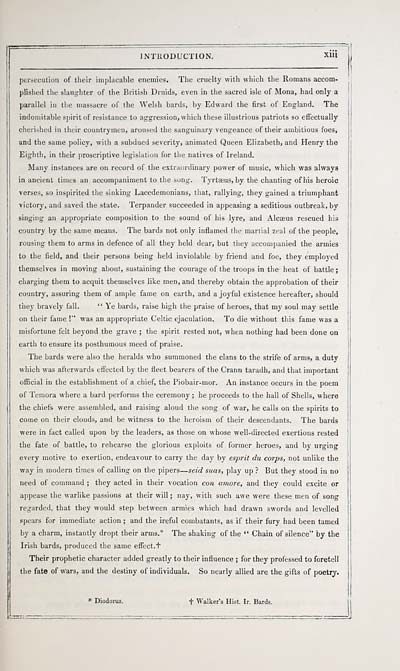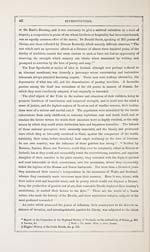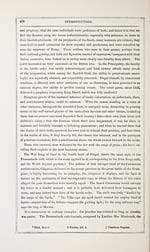Blair Collection > Sar-obair nam bard gaelach, or, The beauties of Gaelic poetry, and lives of the Highland bards
(23)
Download files
Complete book:
Individual page:
Thumbnail gallery: Grid view | List view

INTRODUCTION. xm
persecution of their implacable enemies. The cruelty with which the Romans accom-
plished the slaughter of the British Druids, even in the sacred isle of Mona, had only a
parallel in tlie massacre of the Welsh bards, by Edward the first of England. The
indomitable spirit of resistance to aggression, which these illustrious patriots so effectually
cherished in their countrymen, aroused the sanguinary vengeance of their ambitious foes,
and the same policy, with a subdued severity, animated Queen Elizabeth, and Henry the
Eighth, in their proscriptive legislation for the natives of Ireland.
Many instances are on record of the extraordinary power of music, which was always
in ancient times an accompaniment to the song. Tyrtaeus, by the chanting of his heroic
verses, so inspirited the sinking Lacedemonians, that, rallying, they gained a triumphant
victory, and saved the state. Terpander succeeded in appeasing a seditious outbreak, by
singing an appropriate composition to the sound of his lyre, and Alcaeus rescued his
country by the same means. The bards not only inflamed the marlial zeal of the people,
rousing them to arms in defence of all they held dear, but tiiey accompanied the armies
to the field, and their persons being held inviolable by friend and foe, they employed
themselves in moving about, sustaining the courage of the troops in the heat of battle ;
charging them to acquit themselves like men, and thereby obtain the approbation of their
country, assuring them of ample fame on earth, and a joyful existence hereafter, should
they bravely fall. " Ye bards, raise high the praise of heroes, that my soul may settle
on their fame !" was an appropriate Celtic ejaculation. To die without this fame was a
misfortune felt beyond the grave ; the spirit rested not, wlien nothing had been done on
earth to ensure its posthumous meed of praise.
The bards were also the heralds who summoned the clans to the strife of arms, a duty
which was afterwards effected by the fleet bearers of the Crann taradh, and that important
official in the establishment of a cliief, the Piobair-mor. An instance occurs in the poem
of Temora where a bard performs the ceremony ; he proceeds to the hall of Shells, where
the chiels were assembled, and raising aloud the song of war, he calls on the spirits to
come on their clouds, and be witness to the heroism of their descendants. The bards
were in fact called upon by the leaders, as those on whose well-directed exertions rested
the fate of battle, to rehearse the glorious exploits of former heroes, and by urging
every motive to exertion, endeavour to carry the day by esprit du corps, not unlike the
way in modern times of calling on the pipers — seid stias, play up ? But they stood in no
need of command ; they acted in their vocation con amore, and they could excite or
ajipease the warlike passions at their will ; nay, with such awe were these men of song
regarded, that they would step between armies which had drawn swords and levelled
spears for immediate action ; and the ireful combatants, as if their fury had been tamed
by a charm, instantly dropt their arms.* The shaking of the " Chain of silence" by the
Irish bards, produced the same effect. +
Their prophetic character added greatly to their influence ; for they professed to foretell
the fate of wars, and the destiny of individuals. So nearly allied are the gifts of poetry.
* Diodorus. •)• Walker's Hist. Ir. Bards.
persecution of their implacable enemies. The cruelty with which the Romans accom-
plished the slaughter of the British Druids, even in the sacred isle of Mona, had only a
parallel in tlie massacre of the Welsh bards, by Edward the first of England. The
indomitable spirit of resistance to aggression, which these illustrious patriots so effectually
cherished in their countrymen, aroused the sanguinary vengeance of their ambitious foes,
and the same policy, with a subdued severity, animated Queen Elizabeth, and Henry the
Eighth, in their proscriptive legislation for the natives of Ireland.
Many instances are on record of the extraordinary power of music, which was always
in ancient times an accompaniment to the song. Tyrtaeus, by the chanting of his heroic
verses, so inspirited the sinking Lacedemonians, that, rallying, they gained a triumphant
victory, and saved the state. Terpander succeeded in appeasing a seditious outbreak, by
singing an appropriate composition to the sound of his lyre, and Alcaeus rescued his
country by the same means. The bards not only inflamed the marlial zeal of the people,
rousing them to arms in defence of all they held dear, but tiiey accompanied the armies
to the field, and their persons being held inviolable by friend and foe, they employed
themselves in moving about, sustaining the courage of the troops in the heat of battle ;
charging them to acquit themselves like men, and thereby obtain the approbation of their
country, assuring them of ample fame on earth, and a joyful existence hereafter, should
they bravely fall. " Ye bards, raise high the praise of heroes, that my soul may settle
on their fame !" was an appropriate Celtic ejaculation. To die without this fame was a
misfortune felt beyond the grave ; the spirit rested not, wlien nothing had been done on
earth to ensure its posthumous meed of praise.
The bards were also the heralds who summoned the clans to the strife of arms, a duty
which was afterwards effected by the fleet bearers of the Crann taradh, and that important
official in the establishment of a cliief, the Piobair-mor. An instance occurs in the poem
of Temora where a bard performs the ceremony ; he proceeds to the hall of Shells, where
the chiels were assembled, and raising aloud the song of war, he calls on the spirits to
come on their clouds, and be witness to the heroism of their descendants. The bards
were in fact called upon by the leaders, as those on whose well-directed exertions rested
the fate of battle, to rehearse the glorious exploits of former heroes, and by urging
every motive to exertion, endeavour to carry the day by esprit du corps, not unlike the
way in modern times of calling on the pipers — seid stias, play up ? But they stood in no
need of command ; they acted in their vocation con amore, and they could excite or
ajipease the warlike passions at their will ; nay, with such awe were these men of song
regarded, that they would step between armies which had drawn swords and levelled
spears for immediate action ; and the ireful combatants, as if their fury had been tamed
by a charm, instantly dropt their arms.* The shaking of the " Chain of silence" by the
Irish bards, produced the same effect. +
Their prophetic character added greatly to their influence ; for they professed to foretell
the fate of wars, and the destiny of individuals. So nearly allied are the gifts of poetry.
* Diodorus. •)• Walker's Hist. Ir. Bards.
Set display mode to: Large image | Transcription
Images and transcriptions on this page, including medium image downloads, may be used under the Creative Commons Attribution 4.0 International Licence unless otherwise stated. ![]()
| Early Gaelic Book Collections > Blair Collection > Sar-obair nam bard gaelach, or, The beauties of Gaelic poetry, and lives of the Highland bards > (23) |
|---|
| Permanent URL | https://digital.nls.uk/81868144 |
|---|
| Description | A selection of books from a collection of more than 500 titles, mostly on religious and literary topics. Also includes some material dealing with other Celtic languages and societies. Collection created towards the end of the 19th century by Lady Evelyn Stewart Murray. |
|---|
| Description | Selected items from five 'Special and Named Printed Collections'. Includes books in Gaelic and other Celtic languages, works about the Gaels, their languages, literature, culture and history. |
|---|

